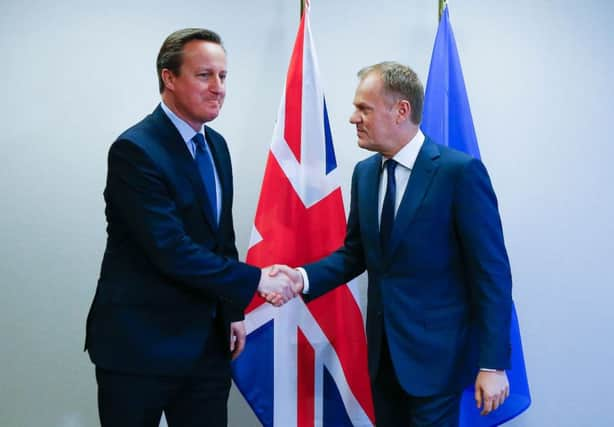David Cameron rules out second EU referendum


The Prime Minister also ruled out a second referendum on Europe if the UK votes to withdraw from the EU on 23 June and stated that the In-Out vote was “a final decision”.
In a statement to the House of Commons, Mr Cameron said a second renegotiation and referendum “is not on the ballot paper”, and questioned the legality and democratic of such a move. The idea is believed to have been floated by Mr Johnson.
Advertisement
Hide AdAdvertisement
Hide AdMr Cameron took an apparent swipe at Mr Johnson over the EU referendum as the two came up against one another in the House of Commons for the first time since the London mayor declared his support for a “Brexit” over the weekend.
In an apparent reference to the mayor’s apparent ambition to succeed him as Prime Minister, Mr Cameron told MPs his own pledge to step down at the general election meant he had “no agenda” other than the interests of Britain.
Making clear that a vote to leave the EU would be followed by withdrawal negotiations under Article 50 of the Lisbon Treaty, Mr Cameron said: “Sadly, I’ve known a number of couples who have begun divorce proceedings, but I don’t know any who have begun divorce proceedings in order to renew their marriage vows.”
His comment was greeted by loud laughter from Labour MPs directed at Mr Johnson, whose own first marriage was dissolved in 1993.
In a further dig at the London mayor, Mr Cameron, said: “I won’t dwell on the irony that some who want to vote to leave apparently want to use a leave vote to remain.
“This is a straight democratic decision, staying in or leaving and no government can ignore that.”
Mr Johnson was one of the first backbench MPs to be called to ask Mr Cameron a question, to loud approval from eurosceptic backbenchers, but opted not to use the opportunity to speak at length on his decision to back a Brexit.
Instead, he asked Mr Cameron “to explain to the House and to the country in exactly what way this deal returns sovereignty over any field of law-making to these Houses of Parliament”.
Advertisement
Hide AdAdvertisement
Hide AdMr Cameron responded: “This deal brings back some welfare powers, it brings back some immigration powers, it brings back some bail-out powers, but more than that, because it carves us forever out of ever-closer union, it means that that ratchet of the European court taking power away from this country cannot happen in future.”
Meanwhile, SNP Westminster leader Angus Robertson warned that if Scotland was pulled out of the EU against its will, Scots would demand a second independence referendum. He said: “If we are forced out of the EU I am certain the public in Scotland will demand a referendum on Scottish independence and we will protect our place in Europe.”
Mr Cameron, responded to the SNP, insisted the referendum was “one UK vote” and not just about Scotland’s status.
Labour MPs taunted Mr Robertson over his new belief in the idea of “better together”.